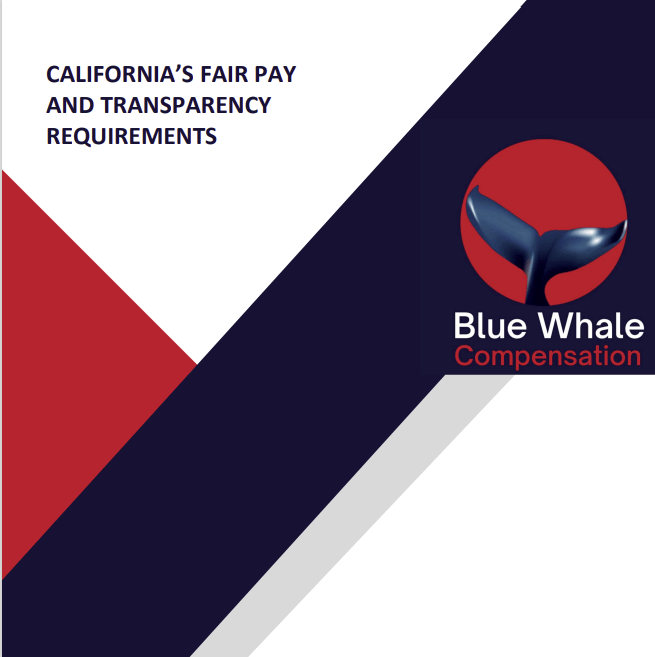
Pay Transparency – Quick FAQs
Pay Transparency & Wage / Salary Posting Requirements:
The Essentials

SALARY RANGE POSTING – The states of Colorado, Washington, New York, California, and Rhode Island all have similar requirements regarding posting salary ranges. That is, employers should post the minimum and maximum that they genuinely believe will be paid for the position. There are also several requirements based on the size of an organization. New York requires salary posting for companies with four or more employees. California’s pay transparency requirement applies to companies with at least 15 employees.
RECORD MAINTENANCE – Companies are asked to maintain pay transparency records, including a history of their salary ranges. For example, New York state law requires employers to maintain a “history of compensation” for posted positions and job descriptions (to the extent they exist). Employers should consider assessing how they store, aggregate, and categorize compensation records for each advertised job opportunity or position. Washington, California, and Colorado have enacted similar requirements.


BEYOND COMPENSATION: BENEFITS, BONUSES & EQUITY – Some states, including Washington and Colorado, require posting compensation information beyond salary ranges. Employers of these states must post the benefits offered with the position, including bonuses, equity, and any additional employee compensation. California, however, does not currently require this.
PAY COMPARABILITY PROTECTION – Most states to enact pay transparency legislation have done so in part to protect employees from gender discrimination. These protections forbid employers from the following: “Paying an employee of one sex a wage rate less than the rate paid to an employee of a different sex for substantially similar work, regardless of job title, based on a composite of skill; effort, which may include consideration of shift work; and responsibility.” In addition to gender, in 2017, California Senate Bill 1063 added extensions to Fair Pay Act protections to prevent race- and ethnicity-based disparities in pay.

Contact us for additional information on navigating your plan with pay transparency and job posting requirements!

Pay Transparency Requirements in WA and CA
Resources to Comply with California and Washington Pay Transparency Requirements
Starting January 1st, 2023, CA and WA employers must comply with a series of measures designed to address pay comparability in the workplace. Blue Whale has prepared the following articles and guidelines to help employers better understand their obligations. For additional support, contact us today for a free, 30-minute consultation.

ACCESS: Blue Whale’s Guide for CA Employers
Our 2022 guide contains tips, regulations, and the latest information on Pay Transparency and the Fair Pay Act.
Covered Topics:
- Fair Pay Act – Background
- Proving Unfair Pay; Justification for Pay Gap Differences
- Pay Transparency For Pay Equity Act, Senate Bill 1162
- Posting Requirements
- Data Reporting
- Employer Resources
- and more . . .
ACCESS: Washington Guide for Employers
Guide on the latest information on Pay Transparency Job Posting Requirements, WA
Covered Topics:
- Employee Job Applicant Rights
- Equal Pay, Definition and Guidelines
- Career Advancement Opportunities
- Open Wage Discussions
- Pay Transparency Requirements
- Employer Resources
- and more . . .

CA Pay Transparency 2023 Legislation: The First 30 Days
After reviewing the first 30 days since 2023 pay transparency laws have gone into effect for California, Washington, and Rhode Island, we have put together an article to provide an overview of requirements for new pay transparency legislation and key findings for how companies have been interpreting and adapting to this legislation in the new year.
CA Transparency Requirements – Senate Bill 1162
Beginning on January 1st, 2023, if your organization has 15 or more employees, you must include the salary range within your job postings and provide the pay scale to your current employees upon request. In addition, your organization must record your employees’ job titles and wage history during employment and for three years post-termination.
Beginning on May 10th, 2023, if your organization has 100 or more employees, you will be required to report to the Civil Rights Department annually the median and mean hourly rate for each of your organization’s job categories broken down by race, ethnicity, and sex.
Penalties

Your organization must comply with California’s Pay Transparency Requirements or risk civil penalties of up to $10,000 per violation. *No penalty will apply for a first violation of the job posting requirement if your organization can show that all job postings for open positions have been updated to include the pay scale.
Your organization will face up to a $100 fine per employee if your organization fails to file the required reports. For subsequent failures, your organization may face a civil penalty of up to $200 per employee.
Reporting Requirements, California
Blue Whale Compensation can help your organization update its compensation structure and policy to manage compliance obligations. In addition, we can help organizations with SB 1162’s reporting requirements.

Contact us today to schedule a free, 30-minute consultation.
Need a plan that satisfies Pay Transparency Requirements? Check Blue Whale’s Integrated Comp

Blue Whale’s Integrated Comp Plan includes the tools to best manage pay equity and compliance obligations under SB 1162 and SB 358, and Washinton’s new pay transparency requirements. It includes training, policy manuals, and implementation support. We recommend this to who are subject to Fair Pay and Transparency Requirements and to companies who wish to embrace their social responsibility towards equitable pay.
Want to learn more about our services? Let’s start the conversation
Compensation in California Crosses a New Frontier: California’s Pay Transparency
California’s Pay Transparency Law- SB 1162
A Guide For California Businesses
Employer Implications

California’s Pay Transparency Law-SB 1162 is making headway. The state legislature approved the bill on Monday, September 13, 2022. California’s Governor Gavin Newsom has until September 30, 2022, to enact the bill.
This new law would require all employers in California with fifteen or more employees to include the hourly rate or salary range on their job postings. In addition, upon request, employers would be required to provide the pay scale to their staff, and employers would be required to submit data payroll data to the state annually broken down by the demographics of their organization.
Groundbreaking State
The state of California is home to many groundbreaking changes in employment law. California’s Equal Pay Act requires employers in the state to disclose the pay range for positions they’re recruiting for to applicants upon request. In addition, employers within the state with at least one hundred employees are required to submit payroll data to the state annually.
California is now setting a groundbreaking precedent by adding an additional layer of transparency. California would be the first jurisdiction to require employers to distribute payroll data based on the demographics of the organization.

What are the implications of Law-SB 1162?

This new law would require all employers in the state of California with fifteen or more employees to include the hourly rate or salary range within their job postings
Upon request, employers would be required to provide information on what they’re paying their staff members
Employers with one hundred or more staff members would be required to report to the state annually the median and mean hourly rate for each job category broken down by race, ethnicity, and sex
In addition, employers with one hundred or more workers through labor contracts would also be required to submit similar data annually
All employers would be required to record their individual employees’ job title and wage history during employment and for three years post termination
California Fair Pay Act-SB358
The California Fair Pay Act-SB358, originally enacted in 1949, was amended on October 6, 2015, to address pay disparity among men and women within the workplace. The amendment requires employers only to rely on relevant factors to determine pay differences for their staff who perform substantially similar work. Such relevant factors include seniority, merit, quantity or quality of production, or a bona fide factor such as education or experience.
SB358 was also amended to protect employees who wish to discuss their pay with their coworkers openly, and it prohibits employers from retaliating against their staff for doing so.
Employer Liability
SB 1162-Failure to file the required reports or disclose the required information to the state of California would bring penalties to employers for non-compliance. In addition, employees would be eligible to file a complaint with the labor commission, which could lead to further fines and violations.
SB358-The division of labor standards enforcement enforces penalties for employers who violate SB358. Employers would be subject to back pay, interest, and liquidated damages.
To eliminate liability, employers are encouraged to document pay decisions within company policies and job descriptions based on relevant job factors, including job requirements, responsibilities, and working conditions.
Other Transparency Trends
Salary is an important factor for job seekers and, at times, can be a make-or-break decision whether to apply. Organizations are starting to recognize this, and the number of job listings with salary information has been increasing.
Some major companies like Microsoft plan to start disclosing pay on all their job listings more than mandated requirements to recruit qualified candidates.
In addition, to meet job seekers’ needs, popular job listing websites like Indeed recognize this trend and have acted. Indeed encourages employees to post their salary, and if not provided, they utilize an algorithm to atomically pull salary information based upon the job description and the characteristics.
Tools and Resources

Blue Whale has assembled articles and white papers to help companies best manage and guide their compensation program. In addition, at no cost, Blue Whale offers reviews that can help your organization best manage the challenges the pay transparency brings to the employer community.
Let’s Start the Conversation
Blue Whale offers a full range of compensation services to help you achieve your business goals. Whether you’re looking to design a new compensation plan, analyze your current program, or stay up-to-date with the latest trends, we have the expertise and resources to meet your needs. Contact us to learn more about our compensation services and how we can help you take your program to the next level. Let’s start the conversation!

Pay Transparency Trends (Legal and Social)
New Rules on How Employers Manage Their Compensation Program
As employees begin questioning their pay, while pay transparency continues to grow in popularity, employers are scrambling to defend their pay practices.
Salary information is becoming more available formally, through legislation, and informally, through social media posts. Employees now have the valuable information to leverage conversations with their managers and challenge current compensation.
States are beginning to require the publication of salary ranges for all classifications. Some examples of the trends in the legislation include:
- CA Equal Pay Act – Employers cannot ask about the previous salary and must disclose pay ranges if asked during an interview
- CO Equal Pay for Equal Work – Employers must include salary ranges and benefits information in every job posting as well as disclose promotion opportunities and keep track of job descriptions
- NY – Employers must post maximums and minimums on all job postings or promotions by November 2022 (extended from May 15th)
More casually, there is a societal shift to make salary information less taboo. Coworkers are no longer ashamed of sharing how much they make in the company. A poll conducted in 2022 by YouGov Plc found that of their sample of 2,500 adults, 42% of Gen Z workers, ages 18-25, and 40% of millennial employees, ages 26-41, have shared their salary information with a coworker or other professional contact.
Many companies are not prepared to discuss the warrants for current salary ranges and are left with unhappy employees who still have pay concerns. Payscale has reported that employees are 50% more likely to leave if they think they are being paid below market, even if they aren’t. Some 57% of people paid at the standard market level believe they are underpaid, and 42% of those paid above the market think they are underpaid. This highlights the value of a compensation study where you can provide employees the ease of mind that they are being compensated based on their talent and skills in a competitive organization.
